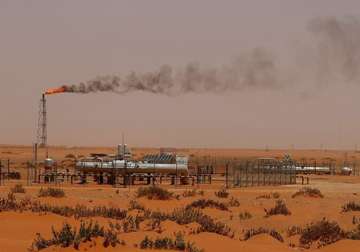Saudi Arabia unveils sweeping plans to end 'addiction' to oil
Saudi Arabia on Monday approved a long-awaited plan laying out reform priorities for the next decade and a half, setting in motion what is likely to be a period of significant economic change in the oil-rich kingdom.
Riyadh: Saudi Arabia on Monday approved a long-awaited plan laying out reform priorities for the next decade and a half, setting in motion what is likely to be a period of significant economic change in the oil-rich kingdom.
The project, which includes plans to float a stake in the world's largest oil company and set up one of the world's largest government investment funds, is meant to provide a blueprint for sweeping reforms to steer the OPEC kingpin sharply away from its decades-long reliance on cheap-to-produce oil.
King Salman said in a short televised announcement that the Cabinet approved the "Vision 2030" plan on Monday, and he called on Saudis to work together ensure its success.
But it was left up to the king's powerful son, Deputy Crown Prince Mohammed bin Salman, to spell out some details of the program in a pre-recorded interview aired shortly after the announcement on Saudi-owned broadcaster Al-Arabiya.
The prince is second in line to the throne, serves as the country's defense minister and chairs a committee formed soon after his father's ascension last year overseeing economic policymaking. That committee, the Council on Economic and Development Affairs, has been focused on reorienting the kingdom away from its heavy reliance on fossil fuels, creating jobs and boosting foreign investment.
In the wide-ranging interview, Mohammed bin Salman described the country as having become addicted to oil and said a planned partial initial public offering of the state-owned oil giant Saudi Aramco was part of the reform program.
He said that while there's been no final assessment on the value of Aramco, estimates have placed it at more than $2 trillion, and that less than 5 percent of Aramco would be offered to public shareholders. Subsidiaries of the company would also be part of the share sale, he said.
The Aramco shares would be listed on the Saudi stock exchange, known as the Tadawul, and on an international exchange, possibly in the United States.
"The vision is a road map of our development and economic goals," he said. "Without a doubt, Aramco is one of the main keys of this vision and the kingdom's economic renaissance."
Aramco boasts the world's largest oil reserves and produces some 10 million barrels of crude a day, giving it outsized influence over world energy markets.
It traces its history to a 1933 agreement between the kingdom and the Standard Oil Company of California to develop the country's oil reserves, and has been known as Aramco — an acronym for the Arabian American Oil Company —since 1944. The Saudi government took full control of the company in a series of buyouts that ended in 1980.
The prince discussed plans to set up a $2 trillion sovereign wealth fund that would be managed by an outside board of directors. It will include cash generated from the Aramco IPO, an existing $600 billion in reserves, and state-owned real estate and industrial areas estimated to be worth $1 trillion. The fund's revenues would go into developing the kingdom's cities, he said.
He said the economic goals of the reforms are intended to eliminate housing and unemployment problems and ensure that water and energy subsidies go to those most in need.
Another way to drive up non-oil revenue, the prince said, is by investing more in mineral mining and boosting the kingdom's own military production capacity. Saudi Arabia was the world's third-largest arms buyer last year, with purchases of more than $87 billion last year.
The prince also said the kingdom, which annually welcomes millions of Muslim pilgrims to the holy cities of Mecca and Medina, would become more welcoming to other types of tourists — in line with Saudi Arabia's values. A new residency visa program could generate additional revenue and would allow Muslims and Arabs to live for extended periods in the country, he said.
Lower oil prices have exposed Saudi Arabia to urgent domestic challenges, including a projected budget deficit this year of nearly $90 billion.
Despite past efforts to move the economy away from its reliance on oil, the kingdom's main export still accounted for 72 percent of total revenue last year.
In addition, 70 percent of Saudis work in the public sector, where the government is spending heavily on wages. The government is looking for ways to support the private sector to help create jobs for the millions of young people who will be entering the workforce in the coming years and will also be looking for affordable housing as they approach milestones such as marriage.
The reform plans were announced just days after U.S. President Barack Obama paid his fourth official visit to Saudi Arabia to press the kingdom and other Gulf states for more help fighting the Islamic State group and in tackling other regional challenges, such as providing financial and political support to Iraq.
